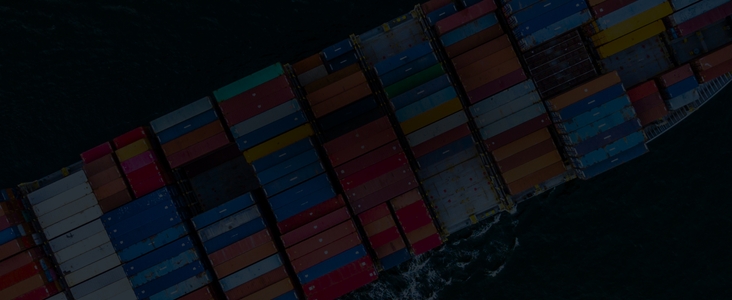
Ocean & Air Freight Shipping From Thailand to Germany
FCL, LCL and Air shipping comprehensive guide and instant online quote
Thailand is an important trade partner for Germany in Asia. Likewise, the largest economy in the European Union has been Thailand’s largest trading partner in Europe for many years consecutively. In 2019, Germany imported goods worth 6.02 billion euros from Thailand.
We understand that importing from Thailand to Germany is not an easy undertaking for any business. The complexities of international air and ocean freight shipping can complicate the process unnecessarily.
That’s why we want to make ocean and air shipping from Thailand to Germany as easy as possible. On this page, you will find vital information about different shipping methods, costs, transit times, and customs clearance procedures.
What Are Your Options for Shipping From Thailand to Germany?

Ocean Freight From Thailand to Germany
Less than Container Load (LCL): LCL shipping means that your goods will travel in a shared container, together with the freight of other shippers. It’s a great option if you don’t want to pay the price for a full container. For smaller shipments LCL is often the cheapest way to import from Thailand to Germany.
Full Container Load (FCL): FCL shipping means paying for the use and transportation of an entire container. It will be yours for the entire journey from Thailand to Germany. For shipments of larger dimensions and weight, it might prove less expensive than LCL in terms of shipping cost-per-unit.
Air Freight from Thailand to Germany
If you are in a hurry, then air shipping will surely get your goods to Germany the fastest. However, it is also the most expensive option in most cases.
How Much Does it Cost to Ship Cargo From Thailand to Germany?

- Nature of goods
- Chosen mode of transport (FCL, LCL, Air)
- Weight of the cargo
- Dimensions of the cargo
- Distance between origin and destination
- Type of service (such as Port-to-Port or Door-to-Door)
If you are still unsure about which mode of transport is right for you, then request quotes for both air and ocean shipping from your freight forwarder.
Most of the time, you will find that the price is very similar for freight that weighs 100 kg or less. Feel free to select the quicker option in this case. If your goods are heavier than 100 kg, you will notice that ocean freight is typically less expensive than air freight.
Shipping light cargo weighing 35 kg or less? Then most freight forwarders, including Shipa Freight, won’t handle your consignment. You can opt for an international courier service instead.
How Long Does it Take to Ship Cargo From Thailand to Germany?
Obviously, ocean and air freight have vastly different transit times. Your freight can reach Germany in as little as three days via air, while it is likely to spend around 35 days at sea.
How Long Does It Take to Ship Cargo by Sea From Thailand to Germany?
To give you a concrete example of a transit time of a container from Thailand to Germany, consider the Bangkok to Hamburg route. It will take around 35 days for your container to reach its destination.
How Long Does It Take to Ship Cargo by Air From Thailand to Germany?
A typical air freight route between Thailand and Germany is Bangkok to Frankfurt. Three days is the usual transit time for cargo on this route.
Customs Clearance in Thailand and Germany
You can’t avoid the customs clearance process when importing from Thailand to Germany. Most companies appoint a seasoned freight forwarder or agent for this important task, as mistakes can be costly. An experienced partner can assure you that all formalities will be settled in line with the latest laws and regulations.
Even when you engage a freight forwarder, you are still in charge of submitting the necessary paperwork. As a minimum, the following documents are required to receive export clearance in Thailand and import permission in Germany:
- Commercial Invoice
- Packing List
- Certificate of Origin
- Letter of Credit or other payment terms (depends on the contract between the parties involved)
- Bill of Lading for ocean freight or Airway Bill for air freight (Shipa Freight will provide this for you)
Sometimes, other documents, such as certificates, permits, and licenses are needed. Your freight forwarder will alert you immediately if this is the case. To take a closer look at the different types of documents, check out our handy documents list.
Should You Choose Ocean Freight or Air Freight?
###Ocean Freight Most shippers choose ocean shipping to transport their commodities the long way. Your sea freight will travel on a dedicated cargo vessel, which will carry it in a shipping container from Thailand to Germany. However, if your cargo isn’t suitable for containerized shipping, your carrier or freight forwarder will propose alternatives. Break-bulk shipping, for example, might be a better option.
When you choose containerized shipping, you have two choices: LCL and FCL. The best one for your needs will be determined by the volume, weight, and nature of your goods. Either option is available as a port-to-port or door-to-door service.
Considerations for LCL Freight Shipping
LCL is a solid choice for smaller consignments. If you are shipping 14 CBM, which is around six standard pallets, or less, then it’s likely the least expensive option. Also, you won’t be burdened with having to choose the right container size. Your freight forwarder or carrier will load the freight for you.
Nevertheless, LCL shipping has certain disadvantages. All consignments will be consolidated into a container at the port of origin and subsequently deconsolidated at the port of arrival. The extra logistics steps are likely to add a day or two to the transit time in comparison to FCL. You will also face more uncertainty with regard to your delivery date. Furthermore, the additional handling and movements can put delicate or perishable goods at risk of damages.
Learn more about Less than Container Load on our dedicated page on LCL Shipping.
Considerations for FCL Freight Shipping
FCL is best if your cargo can easily fill more than half the load capacity of a 20ft container, which is around 14 CBM. In addition, it’s likely to be the least expensive option for very heavy cargo since you are only paying a flat fee for the entire container. High-value and delicate products are also better off fully sealed in a separate container until they reach their final destination.
A drawback of FCL shipping is that it can limit your pick up and delivery options. Keep in mind that the supplier and buyer may not be able to accommodate a full container in their facilities.
Learn more about Full Container Load on our dedicated page on FCL Shipping.
Air Freight
Air shipping is the best option for goods that are urgently required in Germany. Also products with a limited shelf-life benefit from the short transit times. As airlines and airport operators guarantee high levels of security, you can also hand over your high-value freight without hesitation.
Still, air freight is very costly. Most shippers choose this mode of transport only when they are moving small, light consignments of no more than two or three pallets. And, not all cargo will fit inside the body of an aircraft. For very bulky or awkwardly shaped freight, ocean shipping might be your only viable option.
Learn more about Air Freight on our dedicated page by clicking here.
Ocean Cargo Port Guide
Cargo Ports of Origin in Thailand
Laem Chabang
Port Facts:
- Largest port in the country and the 22nd-busiest in the world.
- Situated 25 km north of Pattaya to the southeast of Bangkok.
- Built in the 1990s to relieve pressure on Bangkok’s busy port.
- Facilities include seven container centers as well as several other specialized terminals.
Owned By: Hutchison Laem Chebang International Terminal Ltd.
Annual Container Volume: >500,000 TEUs.
UN/LOCODE: THLCH.
Bangkok
Port Facts:
- Also called Khlong Toei Port, after the district it’s located in.
- Consistently ranks among the top-100 container ports in the world.
- Sits on the banks of the Chao Phraya River.
- Has excellent rail and road connections to Bangkok City.
Owned By: Port Authority of Thailand.
Annual Container Volume: >1.5 million TEUs.
UN/LOCODE: THBKK.
Cargo Ports of Arrival in Germany
Hamburg
Port Facts:
- Third-busiest container port in Europe and among the 20 busiest ports worldwide.
- Sits between the North Sea and the Baltic Sea.
- The location on the Elbe river makes for excellent connections to Germany's hinterland.
- Facilities include four container terminals, around 80 cranes, and 22 berths.
Owned By: Hamburg Port Authority.
Annual Container Volume: >8.5 million TEUs.
UN/LOCODE: DEHAM.
Bremerhaven
Port Facts:
- Sixteenth-largest container port in the world and the fourth-largest in Europe.
- Located on the bank of the river Weser, facing the North Sea.
- Features the largest closed container-management area in the world.
- Quayside of five kilometers can provide berths for up to 14 large container vessels simultaneously.
Owned By: Free Hanseatic City of Bremen.
Annual Container Volume: >5 million TEUs.
UN/LOCODE: DEBRV.
Flying Your Freight: Airport Guide
Airports of Origin in Thailand
Bangkok Suvarnabhumi
Airport Facts:
- One of the largest airports in Southeast Asia with an area of 32,400 square meters.
- The newer of two international airports serving Thailand's capital city of Bangkok.
- Handles around three million tonnes of air cargo every year.
- 95 freight airlines use its logistics and cargo-handling facilities.
German Airports Served: Frankfurt.
Bangkok to Germany Cargo-Only Operators: None.
IATA Code: BKK.
Airports of Arrival in Germany
Frankfurt
Airport Facts:
- Busiest cargo airport in Europe with two million tonnes of freight processed in 2019.
- Also known as Rhein-Main-Flughafen.
- Main hub for Germany’s flagship carrier Lufthansa.
- Offers more direct connections than any other airport worldwide.
- Facilities include four runways as well as extensive logistics and maintenance facilities.
Connected Airports in Thailand: Bangkok.
Thailand to Frankfurt Cargo-Only Operators: None.
IATA CODE: FRA.
Why Ship From Thailand to Germany With Shipa Freight?
You don’t want to take any chances when transporting your valuable freight from Thailand to Germany. We are a digital-first, online-only freight forwarder, and can take care of all of your sea and air freight shipping needs.
Not only that, but we can also simplify your supply chain significantly by providing access to our sophisticated online platform. Now, you can manage all of your imports and exports conveniently in one place.
When you ship with us, you can take advantage of the following benefits:
- Instantly obtain and compare quotes online.
- Place your booking directly online without losing time.
- Always be sure which shipping documentation to prepare.
- Eliminate customs complexities – we will take care of them for you.
- Manage your entire shipping process in one place.
- Get help from our friendly customer service representatives, 24/7.
- Be certain that you comply with international shipping rules and regulations.


